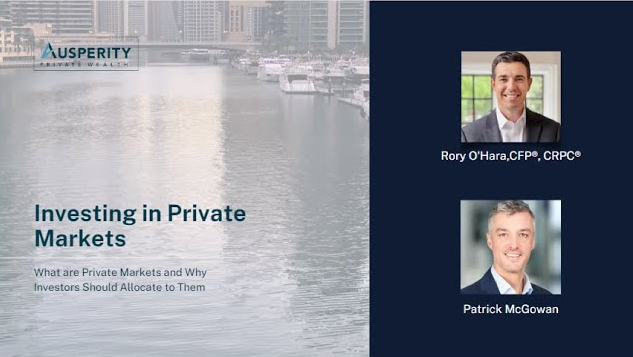Investing in Private Markets



Join us as we discuss investing in private markets

A crucial step in building a sound financial plan is ensuring you have access to cash when you need it, but that doesn’t mean you have to keep that cash in a bank account earning modest interest. For investors looking to maintain a certain level of liquidity while earning a greater return than a savings account can provide, money market investments may be worth considering.
But what exactly is the money market and what types of investments are included in it?
The money market is comprised of short-term debt instruments from Treasury bills and commercial paper to savings accounts and certificates of deposit (CDs). In addition to having short maturities, these investments are characterized by their high liquidity, low risk, and relatively modest yields compared to some other securities.
For most individuals, investing in money markets means investing in a money market fund or bank account that contains a basket of these debt instruments. The money markets can be a source of income, diversification, and liquidity and thus play an important role in many investors’ portfolios.
There are many types of investments within the money market. Here are some of the more prevalent ones to consider.
Treasury bills are debt securities issued by the US Treasury with maturities ranging from four weeks to one year. Investors purchase these securities at a discount and receive their par value (full value) upon maturity. The difference between the purchase price and the price they receive upon maturity is what the investor earns. To illustrate, an investor pays $950 for a 6-month T-bill with a par value of $1000. When the bill reaches maturity in 6 months, the investor receives $1000 for a profit of $50. This payment is considered the interest earned on the bill.
Because they’re backed by the full faith and credit of the US government, T-bills are considered to be among the most stable investments. They can be purchased directly from the US Treasury or accessed indirectly through a money market fund or account.
CDs are financial products sold by banks and other financial institutions that pay interest on a lump sum of cash over a specified period. The maturity of a CD can be anywhere from three months to five years, and there may be a penalty for accessing your cash prior to the maturity date. However, CDs can offer higher yields than savings accounts to make up for being less liquid and they’re insured by the federal government, which makes them a stable investment.
Commercial paper refers to unsecured loans issued by companies or financial institutions looking to fulfill short-term cash needs. These contracts tend to have maturities averaging 30 days and no longer than 270 days. Similar to Treasury bills, commercial paper is bought at a discount relative to its face value and investors earn a profit from the difference between these two prices.
Commercial paper contracts start at $100,000 or more and require the issuer to have a strong credit rating. As a result, many individual investors choose to purchase CPs through money market mutual funds.
Investors can gain exposure to the money market by acquiring shares of a money market mutual fund. These funds trade a high volume of low-risk, short-duration debt instruments (such as the ones described above) in addition to holding cash and cash equivalents. A number of different money market funds exist to meet different investors’ needs – some may hold primarily US Treasuries while others focus on tax-exempt securities.
Money market funds can provide investors with liquidity for when they need access to cash while offering higher yields than saving accounts.
Money market accounts differ from money market funds in that they are a type of savings account set up at banks that are federally insured. These accounts often come with higher minimum balance requirements but can offer higher yields than other types of savings accounts depending on the bank. Eligible accounts are insured by the FDIC up to $250,000 for each depositor.
While many money market accounts may come with debit cards and the ability to write checks, issuers limit withdrawals based on federal regulations. These accounts are not meant for everyday spending, but they can provide cash liquidity when needed.
The money market may provide an opportunity to earn a greater return on your cash than you’d earn from a standard savings account while still affording you the liquidity you need to meet cash needs. As with any investment decision, consider consulting with a financial advisor before taking action. An advisor can help you assess your needs and identify a suitable allocation between money markets and
other investments.
Reach out to a financial advisor today to learn more about the money market or make adjustments to your investment strategy.
Best,

Robert (Rory) J. O’Hara III, CFP®, CRPC®
Founder | Senior Managing Partner

After a lifetime of hard work and careful planning, you deserve a comfortable retirement. Once you stop earning a wage, effectively maintaining your nest egg becomes more crucial than ever, and mismanaging your resources may keep you from achieving the lifestyle you’ve envisioned for yourself.
With that in mind, here are a number of common missteps made by retirees that you can learn from and avoid in your own life.
While it’s important to enjoy your retirement years, it’s critical to be realistic about your finances. Remain cognizant of the fact you’re likely not earning as much as you used to during your working years and you probably have more time on your hands, too. The first few years of retirement, in particular, can be a difficult adjustment period for retirees as they get accustomed to living on a fixed income.
Old spending habits can be hard to break. Start by identifying your various income sources – from Social Security to taxable and tax-advantaged investments – and then outline your current and future expenses. Be sure to consider not just your bills (medical, housing, etc.) but also how you’ll spend your time in retirement. Do you see yourself traveling the world? What types of leisure activities would you like to engage in? Use your projected monthly income and expenses to come up with a sustainable withdrawal strategy that’s reflective of your new reality.
Whether it’s spoiling the grandkids with toys and technology or providing some extra support to your adult children, giving too much money away is a frequent cause of financial strain for retirees. It’s okay to show generosity to loved ones, but keep an eye on your spending and ensure that it falls within your budget.
Remember that your children and grandchildren are likely far better positioned to recover from financial difficulties than you are, so be careful not to put your financial security at risk.
Even if you’re healthy and active today, it’s advisable to have a healthcare plan in place for any possibility; after all, you never know when you might need it. The average couple can expect to spend over $315,000 in medical expenses during retirement, underscoring the importance of maintaining adequate insurance coverage in addition to a medical fund.1 Consider your current health, whether you’re predisposed to any health conditions, and what you might require in terms of long-term care. Then build a buffer into your budget for the unexpected. Without a safety net, an injury or illness could result in hefty bills that eat into your retirement savings.
Another common mistake people make in retirement is taking on new and unnecessary debt by upsizing or making extravagant purchases. If you’re considering buying a larger home, a fancy new car, or flying around the world in first class, consider how those expenses fit into your financial picture and whether you’d have to finance them with debt. Having an emergency fund can help ensure you don’t have to use credit cards or loans to cover unexpected expenses. If you have outstanding debt, prioritize paying down the accounts that charge the most interest to keep them from accumulating and draining your nest egg over time.
Your approach to investing should be reflective of your goals and circumstances, both of which change upon retirement and evolve over the course of retirement. If you had an aggressive investment allocation while working, you should consider a more conservative approach in retirement that’s less focused on long-term growth and more focused on capital preservation. Failing to adjust your allocation can expose you to undue risk and could result in losses that you don’t have the runway to recover from. A financial advisor can help you assemble the right mix of investments based on your circumstances.
Diversification represents a pillar of any well-rounded investment strategy. Whereas being too heavily invested in one asset can leave you vulnerable to adverse market movements, diversifying your investments across different asset classes and within those asset classes can keep you from being too exposed to a particular name or sector. Diversification can help you manage risk and smooth out your portfolio’s performance during volatile periods. This is another area where an advisor can help you.
Taxes may be an inevitability but there are ways you can reduce your total tax obligation by planning proactively. For instance, a Roth IRA may allow you to make tax-free withdrawals during retirement and you can roll funds into a Roth from your tax-deferred retirement accounts. Take some time to understand the various rules surrounding retirement account withdrawals so you can avoid having to pay penalties for withdrawing funds too early or missing a required minimum distribution (RMD). A tax professional can work with you to manage your nest egg in a tax-efficient manner.
Perhaps the most common worry in retirement planning is whether or not you have enough saved to last the rest of your life. Advancements in healthcare and technology are constantly extending life expectancies and improving Americans’ quality of life, which can make it more challenging to anticipate the full cost of retirement.2 That’s why it’s important to plan conservatively and not sacrifice your long-term financial stability by taking a short-term view. Thinking of your retirement in five-year blocks may help you achieve a more complete picture of your golden years.
If you need help developing a retirement strategy to support your desired lifestyle, a financial advisor can provide you with the guidance you need. Contact a financial advisor today to discover how you can protect your wealth after leaving the workforce.
Best,

Robert (Rory) J. O’Hara III, CFP®, CRPC®
Founder I Senior Managing Partner
Endnotes
1 (May 16, 2022) Americans can expect to pay a lot more for medical care in retirement. CNBC, https://www.cnbc.com/2022/05/16/americans-can-expect-to-pay-a-lot-more-for-medical-care-in-retirement.html
2 (Aug. 13, 2022) Life Expectancy in the U.S. Dropped for the Second Year in a Row in 2021. CDC, https://www.cdc.gov/nchs/pressroom/nchs_press_releases/2022/20220831.htm#:~:text=AIAN%20life%20expectancy%20has%20declined,2020%20to%2076.4%20in%20